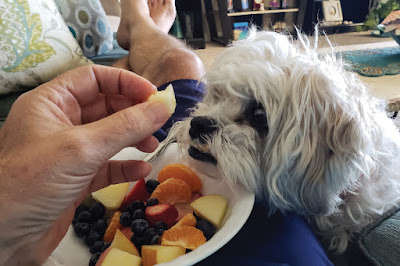Fruits are universally acclaimed, no matter the country or culture. And for good reason; fruits are chock full of vitamins and minerals, with the benefit of being as delicious as they are healthy. Including a selection of fruits in a diet helps avoid deficiencies, strengthens the immune system, and aids digestion. They also serve as brilliant alternatives to the typically fried and nutritionally deficient snacks.
Can my Dog Eat Fruits?
The benefits of fruits aren't just limited to humans either, since nature's goodness can be enjoyed by our four-legged friends as well. However, dogs cannot eat everything we can, and every dog owner is well aware of the list of human foods that can be detrimental to a dog's health. Dogs have different dietary requirements to humans, and since they like to sample everything while not knowing what is/isn't harmful to them, the onus is on us to make sure they only eat foods which are safe for them.
You may be wondering then, is it even healthy for my dog to eat fruits? The answer is yes, provided you feed them the correct fruits. Dogs are omnivores, and a balanced diet for them includes a variety of fruits, vegetables, meat, and grains. So, yes, your dog can eat fruits. The next thought you may have is, how do I know what fruits are good for my dog? What fruits are going to boost their health, and which ones are detrimental to it? What precautions should you take before serving certain fruits, and which ones to avoid altogether?
What Fruits Can I Serve to My Dog?
Fortunately,
there are a host of fruits your dog can enjoy safely. Here are a few of them
you can serve.
- Apples: Apples are great snacks, as they are an excellent source of Vitamin A and Vitamin C. Do remember to remove the core and seeds before, as those aren’t good for them like they aren’t for us.
- Oranges: These colourful fruits have Vitamin C and fibre in abundance, just remember to remove the flesh and seeds before you serve it.
- Cucumbers: These fruits are high in water content and serve as a good source of Vitamin C and Vitamin K. Bonus: it’s a fruit with a low sugar and calorie count, meaning it can be safely served as a snack.
- Peaches: They make for a juicy treat, provided you remove the pits before serving.
- Watermelon: This water-rich fruit is great for beating the heat and staying hydrated on a scorching summer day. As with all fruits, remove the seeds if any.
- Mangoes: Affectionately known as the king of fruits, mangoes are a great source of Vitamin A, Vitamin C, and Vitamin E, but also high in sugar. You can serve mangoes as a treat on special occasions.
- Bananas: Packed with potassium and vitamins, bananas are a great treat, provided you do so occasionally. Its high sugar content makes it a less-than-ideal daily treat.
What Fruits Are Harmful to My Dog?
- Grapes: Grapes, and by extension raisins, are toxic to dogs, to the point where even a small amount can prove fatal. Keep these well out of reach of your dog if they're a staple in your fruit basket, and pay attention to its dry-fruit cousin during the holiday season.
- Cherries: The cherry plant and its seeds contain cyanide, which is toxic to dogs. Avoid them and dispose of the seeds and stems if they are around your house.
- Tomatoes: The tomato fruit itself is not harmful to dogs. But, the green stem that's often left attached to it can upset a dog's stomach, so it’s probably best to avoid them altogether.
- Potatoes: Raw potatoes contain solanine, which can upset your dog’s stomach. Keep out of your dog’s reach.
- Avocados: The seed, leaves, and skin of the avocado fruit all contain the toxin persin, which can cause an upset stomach, diarrhoea, and vomiting. Keep these healthy breakfast staples well away from your dog.
What if my Dog Eats Such a Fruit?
If you think your dog has ingested something that can be harmful to them, there are a few symptoms you can look out for:
- Vomiting
- Diarrhoea
- Dehydration
- Twitching
- Low energy levels
- Fatigue
- Constipation and change in normal posture




No comments:
Post a Comment